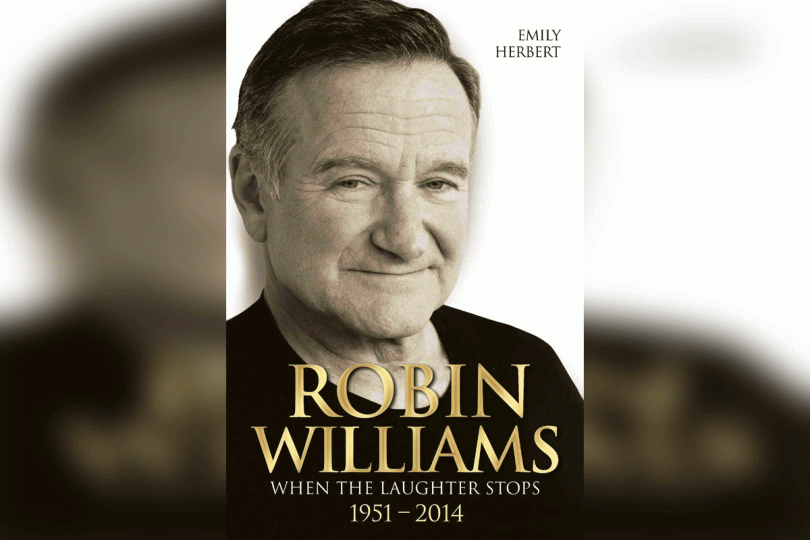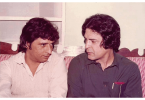The best way to pay tribute to actor Robin Williams on his 8th death anniversary is to read about his life and times
Think of the name Robin Williams and the first thing that comes up in one’s mind are the characters that he brought to life in TV and films; if you remember him as the alien Mork in the hit TV series Mork and Mindy, or as Genie in Aladdin, Alan Parish in Jumanji, as well as Mrs. Doubtfire and Patch Adams, then your childhood was better than most of your contemporaries. Emily Herbert’s biography Robin Williams – When the Laughter Stops tries to unravel the enigma known as Robin Williams and takes a trip down memory lane to find out what made him special.
During her trip into the past, the author unveils many factors that might have contributed to Robin Williams’ genius, and they need not be positive factors. The absence of his ‘busy’ parents from his life, the constant traveling, not having a stable school and the bullying made him take up comedy as a defense mechanism, and when he finally had a stable institution to study in, he decided to polish his skills as a comedian.
The book also discusses the meteoric rise and the sudden fall of Robin Williams, the performer who had to take refuge in stand-up acts as well as TV during the final years of his life, because the films he was appearing in were not garnering the kind of profits that were expected from them. Not only does the author talk about the films he made that are now considered cult classics but also his ability to ad lib and mimic others that he used in many of his performances. She also debates that the failure of his films in the last 15 years might have contributed to his suicide, but she also points out that doing fewer comic roles was one of the factors he couldn’t connect with the audience.
Although this edition was published soon after Robin Williams’s death in August 2014, it talks about the many problems he faced that might have something to do with his decision to end his life. One of them might be the return of his drinking problem, which he kept in check during his prime, whereas the other was his personal life that saw him go through three marriages, two of which ended in divorce. Add to that his not known video game addiction and Robin Williams was more like a ticking bomb in his last few years, and had he stayed alive, he might have become more troublemaker than he already was.
Not only does this biography talk about Robin Williams’s return to TV after three decades as the main lead actor of a comedy series, but it also explains why the series The Crazy Ones was cancelled just one season later. Despite featuring him at his comical best, the series couldn’t garner the ratings expected from a Robin Williams vehicle and contributed to his decline rather than helping him climb back to his rightful position.
The way the author has expressed her thoughts on Robin Williams might seem unbiased but some of his films deserved better coverage here, including Patch Adams and Insomnia which were dismissed as failures, despite being good. Similarly, his decision to switch to supporting characters after turning fifty and why his second wife Marsha stopped taking interest in his career, weren’t explained in this book. It would surely have made a better read than the Twitter messages that dominated the first chapter, especially at a time when nearly everyone has access to the World Wide Web.
It wouldn’t be incorrect to say that Robin Williams brought laughter and joy to the lives of all those who saw him perform on TV, in films, and even on stage. His relationship with his closer-than-friend Christopher Reeve gets mentioned in these pages as well as his reaction to the Superman actor’s death, and while the author blames Reeve’s death as the turning point of Robin Williams’ character, it had more to do with his growing age than anything else.
The biography uses quotes from Robin Williams’ old interviews to provide his thoughts on certain matters while the author talks to some of the people who were associated with the 63-year-old actor during his life. However, the ‘20 Great Robin Williams Jokes’ at the end of the book would remind you of his brilliance as a stand-up comedian. While his competitors accused him of using their ideas to create his own jokes, Robin Williams left them far behind due to his ability to create jokes from absolutely nothing and even denied the plagiarism claims in his interviews.
One may or may not agree with Emily Herbert’s sensitive biography, but it does pay tribute to a genius who was nothing short of a legend in his lifetime. While doing voice acting for the Genie in Aladdin, he inspired the animators so much that they added lines he spoke into the script. They were happy to welcome him back after his issue with Disney was resolved, and promptly replaced the backup actor with Robin Williams, after the sequel had begun production.
Had he been alive today, Robin Williams would easily have been popular amongst young and old alike, for there was a child inside the funny man. This book does justice to his life and times as well as brings forward the highlights and lowlights of his career. It might not be the best book about the actor but it will certainly revive the reader’s interest in the man who could play a genie, an RJ, a US President, and an alien without breaking a sweat. Must have been a legend!







